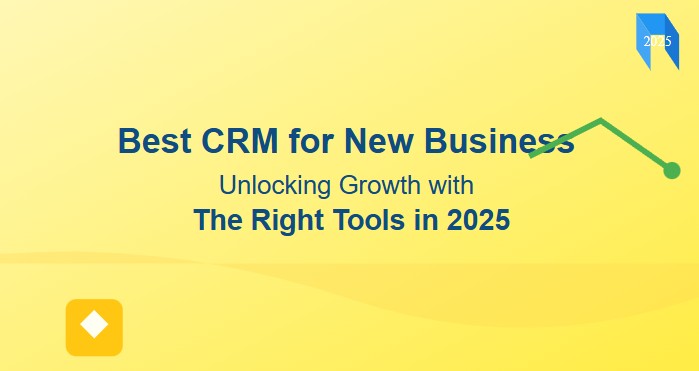In today’s hyper-connected digital age, every new business must prioritize one key resource to succeed: customer relationships. Managing those relationships efficiently is not optional — it’s mission-critical. That’s where a Customer Relationship Management (CRM) system becomes your business’s secret weapon.
But here’s the catch: not every CRM is built for startups or new businesses. You need a platform that’s lightweight yet powerful, budget-friendly yet scalable, intuitive yet feature-rich.
In this in-depth guide, we’ll explore:
-
🔹 Why new businesses need a CRM
-
🔹 Top features to look for
-
🔹 Best CRMs for startups in 2025
-
🔹 A comparison of the top platforms
-
🔹 Tips for choosing the right CRM for your business
Let’s dive in. 💼🚀
Table of Contents
Why New Businesses Need a CRM
Starting a new business is like trying to ride a bike while building it. Between customer acquisition, product development, marketing, and scaling — things can get messy. Here’s where a CRM saves the day:
1. Centralized Contact Management
No more spreadsheets or sticky notes. CRMs store all customer information in one place — accessible to your entire team.
2. Improved Customer Interactions
With a CRM, you can track every interaction — emails, calls, meetings — ensuring no lead falls through the cracks.
3. Sales Pipeline Clarity
Visualize where each prospect is in the sales funnel. Close more deals with less guesswork.
4. Automated Workflows
Trigger follow-ups, set reminders, and automate repetitive tasks — saving precious time.
5. Better Team Collaboration
Assign leads, share notes, and collaborate across departments with real-time updates.
Top Features to Look for in a Startup-Friendly CRM
Not all CRMs are created equal. As a new business, you need features that accelerate growth without overwhelming your team.
Here’s what to look for:
| Feature | Why It Matters |
|---|---|
| Ease of Use | Minimal learning curve. Focus on selling, not training. |
| Affordability | Tiered pricing that suits your startup’s budget. |
| Scalability | Grow without migrating to a new system later. |
| Integration | Sync with your tools: Gmail, Slack, Zoom, etc. |
| Mobile Access | Manage leads on-the-go. |
| Automation | Save time by automating repetitive tasks. |
| Custom Dashboards | Track what matters most to your business. |
| Strong Support | Helpful documentation, chat, and onboarding tools. |
Top 5 Best CRMs for New Businesses in 2025
After deep analysis and industry research, here are the 5 best CRM platforms tailored for new businesses:
1. HubSpot CRM (Free & Paid Plans)
🔥 Best Overall CRM for Startups
Pros:
-
Free forever plan with premium upgrades
-
Easy drag-and-drop sales pipeline
-
Email tracking and templates
-
Marketing, sales, and service hub integration
Cons:
-
Advanced features can get pricey
-
Less customizable than enterprise CRMs
🧑💼 Best for: Startups looking for an all-in-one sales and marketing toolkit.
2. Zoho CRM
🔥 Best CRM for Customization
Pros:
-
Highly customizable workflows
-
AI-powered sales assistant (Zia)
-
Affordable for small teams
-
Powerful automation features
Cons:
-
Slightly steeper learning curve
-
Interface can feel overwhelming initially
🧑💼 Best for: Businesses with complex sales processes needing custom rules.
3. Pipedrive
🔥 Best CRM for Visual Sales Pipelines
Pros:
-
Kanban-style sales view
-
Super user-friendly UI
-
Built-in calling & email sync
-
Great mobile app
Cons:
-
Limited marketing automation
-
Add-ons can increase cost
🧑💼 Best for: Teams focused on closing deals and managing pipelines visually.
4. Freshsales (by Freshworks)
🔥 Best AI-Driven CRM for New Businesses
Pros:
-
AI-based lead scoring
-
Built-in phone & email features
-
Visual deal pipelines
-
Affordable starter plans
Cons:
-
Fewer third-party integrations than others
🧑💼 Best for: Startups wanting smart automation and intelligent workflows.
5. Monday Sales CRM
🔥 Best CRM for Project-Based Startups
Pros:
-
Combines CRM + project management
-
Fully customizable dashboards
-
Beautiful interface
-
Easy onboarding for teams
Cons:
-
May lack deep CRM-only features
-
Automation requires premium plans
🧑💼 Best for: Teams juggling sales and operations in one place.
Comparison Table: Quick Glance
| CRM | Best For | Price (Starting) | Free Plan | AI Features |
|---|---|---|---|---|
| HubSpot | All-in-one growth | $0 | ✅ | Basic |
| Zoho CRM | Custom workflows | $14/month | ✅ | ✅ |
| Pipedrive | Visual pipelines | $14.90/month | ❌ | ✅ (limited) |
| Freshsales | AI automation | $15/month | ✅ | ✅ |
| Monday Sales | CRM + project blend | $10/month | ✅ | Basic |
How to Choose the Right CRM for Your Business
Selecting a CRM isn’t just a checklist exercise. Here’s a step-by-step approach:
✅ 1. Define Your Business Goals
Are you focusing on customer retention, lead generation, or closing deals? Your CRM should align with your main objective.
✅ 2. Map Your Sales Process
From first touch to final sale, identify where the CRM will enhance or automate steps.
✅ 3. Test Drive With Free Trials
Don’t just read reviews — test the platform with real data and see if your team enjoys using it.
✅ 4. Prioritize Integration
Pick a CRM that works with tools you already use (like email, calendars, marketing platforms).
✅ 5. Plan for Growth
Don’t just think short-term. Choose a platform that can scale as your business grows.
Final Thoughts: Your CRM is a Growth Engine
The right CRM can be a game-changer for your startup. Whether you’re just starting out or ready to scale, a CRM gives you the power to track leads, automate tasks, and close deals faster.
Our top recommendation? Start with HubSpot CRM if you want instant functionality, or Pipedrive for a laser focus on sales pipelines.
Investing in a CRM isn’t just about software — it’s about investing in better customer experiences, stronger sales outcomes, and predictable growth.




